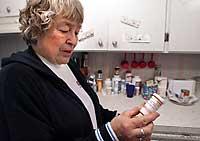 |
 |
 |
| Your account | Today's news index | Weather | Traffic | Movies | Restaurants | Today's events | ||||||||
|
|
Thursday, April 29, 2004 - Page updated at 11:19 A.M. Medicare discount cards: what seniors need to know By Kyung M. Song
Millions of seniors are. Starting in June, 40 million Americans covered by Medicare may get some relief from high drug costs with a new discount card approved by the federal government. The cards are the first step in a landmark Medicare prescription-drug plan signed into law by President Bush last December. Congress approved the plan to give seniors a break on drug prices until the Medicare prescription-drug benefit becomes available in January 2006. But far from embracing the discount cards, many seniors are reacting with befuddlement, skepticism or hostility. Details of the discount program are so bewildering, or unavailable, that most seniors have yet to figure out whether they'd benefit at all, insurance experts and seniors say. "There are millions of people who haven't the foggiest notion of what this is all about," said Francis Cummings, a retired aerospace engineer in Port Angeles who is covered by Medicare, the federal program that provides health insurance for people who are disabled or 65 and older. "Understanding this plan is almost as bad as filling out an income-tax return." As soon as today, the federal Centers for Medicare & Medicaid Services expects to release crucial details on its Web site about the voluntary discount-card program, including how much seniors will save on which drugs and at which pharmacies. Seventy-two cards will be offered, 39 of which will be accepted in all 50 states.
Cummings and his wife, who have no prescription-drug insurance, spend about $600 a year for two eyedrops for his glaucoma. But given their modest drug costs, coupled with discounts they already get from State Farm supplemental insurance, Cummings doubts a Medicare discount card will pay for itself. "I have no idea whether I'd get any discounts. I'd be very reluctant to gamble $30" on a card, said Cummings, 82. "It appears to me that it may very well be worthless." His isn't the only disenchanted voice. Families USA, a nonprofit national group pushing for affordable health care, slammed the Medicare cards as "a very flawed program." Senate Democratic leader Tom Daschle, of South Dakota, warned, "these cards are expected to provide little meaningful value to seniors."
What's more, many Medicare beneficiaries already receive senior discounts through drug cards issued by pharmacies, drug companies or membership organizations. An analysis by two Harvard University researchers this month found that seniors using seven existing discount cards saved an average of 17 percent off retail prices. The discounts averaged 41 percent on generics and 14 percent for brand-name drugs, which accounted for most of the sample group's out-of-pocket drug spending. In contrast, the Medicare discount cards are expected to shave an average of 10 percent to 15 percent off the price of all drugs.
Some older Americans could use the financial relief. Seniors make up 13 percent of the U.S. population, Families USA says, but account for 42 cents of every dollar spent on prescription drugs. Yet one-third of Medicare seniors have no drug coverage. Federal officials project that older citizens without drug coverage will spend an average of $1,400 each for medications this year. Meanwhile, prescription-drug costs keep rising. Between 2002 and 2003, prices for the 50 drugs most frequently prescribed for older Americans rose by an average of 6 percent, more than three times the overall inflation rate, says Families USA, which has been tracking drug prices since 1999. The poorest seniors may reap the new Medicare cards' biggest savings. That's because they will qualify for outright credits, not just discounts, on their drugs. Individuals who make no more than $12,569 a year ($16,862 for couples) will get a $600 credit this year and $600 more in 2005 toward drug purchases. "It's a straight subsidy," said Juliette Cubanski, a doctorate candidate at Harvard University and co-author of the report on the Medicare cards. "I think it's less clear what kind of benefit it will provide to others." AARP Washington estimates 145,000 seniors in the state would qualify for the $600 credits. Card sponsors say higher-income seniors may be underestimating the potential savings from the discounts. Pharmacy Care Alliance, which represents 45,000 pharmacies nationwide, including Bartell Drugs and Rite Aid, says consumers can expect to save an average of 40 percent on generic and 20 percent on brand-name drugs with its discount cards. "This really is a valuable benefit for seniors," said Mary Ann Wagner, an alliance spokeswoman. "We are confident that they're going to be able to save a quite a bit of money." Wagner said seniors should be able to use the Pharmacy Care Alliance discount card for virtually every medication they take. She also said the percentage of discounts won't change for the life of the cards, although nothing prohibits participating pharmacies from raising their base prices. "But prices go up and down today," Wagner said. "So it won't be any different from today." The importance of shopping around Pharmacy Care Alliance was formed solely to sponsor a Medicare card. The group hopes the cards will steer customers to local pharmacies instead of using mail-order firms. Pharmacy Care Alliance, like other card sponsors, will update weekly the maximum prices for different drugs charged at its participating pharmacies. The price lists will be available on www.medicare.gov or by calling 800-MEDICARE (800-633-4227). The price list could be a powerful tool for comparison shopping. By looking up the retail prices and discounts for their drugs, consumers can calculate whether they could get a better deal through other sources, including non-Medicare discount cards. Janet Slauson, a former trauma nurse at Harborview Medical Center, remains unconvinced about Medicare cards' benefits. Slauson, who is 70 and lives in Lake Forest Park, has prescription-drug coverage through her health plan for retired state employees. She is trying to figure out whether she can use the discounts on top of her insurance coverage. If she can't, Slauson thinks there may be no point in signing up for a Medicare discount card. Rod Haynes, a Seattle spokesman for the Centers for Medicare & Medicaid Services, cautions that seniors who have prescription-drug insurance should not dismiss the cards out of hand. Many seniors have skimpy drug coverage, Haynes said, and they could save money with the cards once their benefits run out. Slauson isn't waiting until June for her discounts. She takes three ulcer drugs every day and a painkiller for a back injury she suffered while working at Harborview. With her retiree insurance, Slauson pays $63.20 for a month's supply of Nexium for her ulcer. But last week, Slauson learned she could buy 90 days' worth of Nexium for $80 through Express Scripts, her insurer's mail-order pharmacy. Slauson doubts a Medicare discount card can top that. "I'm going to go with this mail order," she said. As for the upcoming Medicare cards, "if you don't understand it, it's harder to like it." Kyung Song: 206-464-2423 or ksong@seattletimes.com Copyright © 2004 The Seattle Times Company
|
|
|||||||||||||||||||||||||||||||||||||||||||
seattletimes.com home
Home delivery
| Contact us
| Search archive
| Site map
| Low-graphic
NWclassifieds
| NWsource
| Advertising info
| The Seattle Times Company

